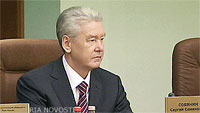The art of remaining Moscow mayor

(Moscow News – themoscownews.com – David Burghardt – June 6, 2013) Sergei Sobyanin made an unexpected move by resigning as the Moscow mayor and instigating snap elections for September in order to secure the next five years in City Hall.
In actuality, Sobyanin holds a solid popularity rating of well over 50 percent among Muscovites, has done a lot to “spruce up” the city, including cleaning up parks and building playgrounds around the capital. But resigning as the current Moscow mayor and being appointed “acting mayor” in order to hold snap elections on September 8 is pretty much a slap in the face to potential candidates for the post, who would have otherwise began campaigning next year. Sobyanin’s term in office was to end in 2015.
In this move, Sobyanin grabs the advantage over would-be opponents and secures the legitimacy of his being elected in by popular vote (the first in over a decade). Candidates have a minimal amount of time to announce their intentions to run, minimal amount of time to rustle support, minimal amount of time for campaigning, and a minimal amount of time to draw up plans to improve the city in order to get the majority of voters behind them.
Another advantage is the fact that many Muscovites are or will be on vacation or at their dachas for most of the summer, meaning they’re not going to be listening to campaign speeches while stretched out on the beach somewhere or digging in their garden. When they get back at the beginning of September, they’re most likely to vote for the person who they know, i.e. Sobyanin. After all, Moscow didn’t collapse in their absence.
In a “normal democracy” snap elections are not called. The current politician in a democracy plays out his role to the end of his elected term. Sobyanin’s story is a little different in that he was appointed mayor by the president after long-time Yury Luzhkov was sacked by then-president Dmitry Medvedev.
Sobyanin’s unexpected resignation raises many questions that can be answered only theoretically (or cynically). Would Sobyanin secure the mayor’s office if elections were held at the end of his term in 2015? Probably, in my opinion. If Sobyanin wins in September, does that take him out from under Putin’s thumb because he was voted in by the populace and not appointed by the president? The president still holds the power to remove governors and mayors (this has been exercised at least three times).
What Sobyanin is doing is completely legal, whether the opposition likes it or not. It is, however, extremely unfair to possible candidates, who, most likely, will have to wait on the sidelines until 2018.
